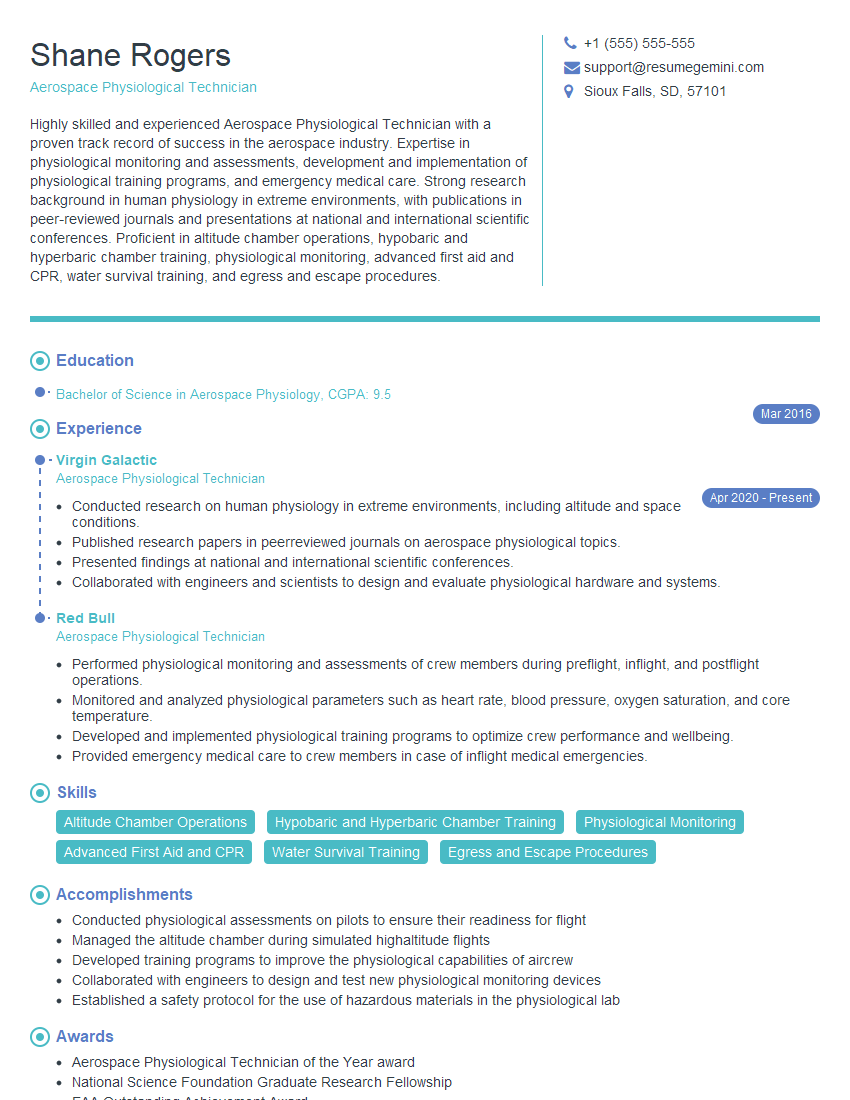Are you a seasoned Aerospace Physiological Technician seeking a new career path? Discover our professionally built Aerospace Physiological Technician Resume Template. This time-saving tool provides a solid foundation for your job search. Simply click “Edit Resume” to customize it with your unique experiences and achievements. Customize fonts and colors to match your personal style and increase your chances of landing your dream job. Explore more Resume Templates for additional options.

Shane Rogers
Aerospace Physiological Technician
Summary
Highly skilled and experienced Aerospace Physiological Technician with a proven track record of success in the aerospace industry. Expertise in physiological monitoring and assessments, development and implementation of physiological training programs, and emergency medical care. Strong research background in human physiology in extreme environments, with publications in peer-reviewed journals and presentations at national and international scientific conferences. Proficient in altitude chamber operations, hypobaric and hyperbaric chamber training, physiological monitoring, advanced first aid and CPR, water survival training, and egress and escape procedures.
Education
Bachelor of Science in Aerospace Physiology
March 2016
Skills
- Altitude Chamber Operations
- Hypobaric and Hyperbaric Chamber Training
- Physiological Monitoring
- Advanced First Aid and CPR
- Water Survival Training
- Egress and Escape Procedures
Work Experience
Aerospace Physiological Technician
- Conducted research on human physiology in extreme environments, including altitude and space conditions.
- Published research papers in peerreviewed journals on aerospace physiological topics.
- Presented findings at national and international scientific conferences.
- Collaborated with engineers and scientists to design and evaluate physiological hardware and systems.
Aerospace Physiological Technician
- Performed physiological monitoring and assessments of crew members during preflight, inflight, and postflight operations.
- Monitored and analyzed physiological parameters such as heart rate, blood pressure, oxygen saturation, and core temperature.
- Developed and implemented physiological training programs to optimize crew performance and wellbeing.
- Provided emergency medical care to crew members in case of inflight medical emergencies.
Accomplishments
- Conducted physiological assessments on pilots to ensure their readiness for flight
- Managed the altitude chamber during simulated highaltitude flights
- Developed training programs to improve the physiological capabilities of aircrew
- Collaborated with engineers to design and test new physiological monitoring devices
- Established a safety protocol for the use of hazardous materials in the physiological lab
Awards
- Aerospace Physiological Technician of the Year award
- National Science Foundation Graduate Research Fellowship
- FAA Outstanding Achievement Award
- NASA Early Career Investigator Award
Certificates
- Certified Aerospace Physiologist
- Certified Aerospace Medical Technician (CAMT)
- Certified Aviation Physiologist (CAP)
- Certified Dive Medical Examiner (CDM)
Career Expert Tips:
- Select the ideal resume template to showcase your professional experience effectively.
- Master the art of resume writing to highlight your unique qualifications and achievements.
- Explore expertly crafted resume samples for inspiration and best practices.
- Build your best resume for free this new year with ResumeGemini. Enjoy exclusive discounts on ATS optimized resume templates.
How To Write Resume For Aerospace Physiological Technician
- Highlight your experience and skills in aerospace physiological monitoring and assessments.
- Showcase your knowledge of human physiology in extreme environments.
- Emphasize your ability to develop and implement physiological training programs.
- Demonstrate your proficiency in emergency medical care and first aid.
- Include any research experience or publications in aerospace physiological topics.
Essential Experience Highlights for a Strong Aerospace Physiological Technician Resume
- Performed physiological monitoring and assessments of crew members during preflight, inflight, and postflight operations.
- Monitored and analyzed physiological parameters such as heart rate, blood pressure, oxygen saturation, and core temperature.
- Developed and implemented physiological training programs to optimize crew performance and wellbeing.
- Provided emergency medical care to crew members in case of inflight medical emergencies.
- Conducted research on human physiology in extreme environments, including altitude and space conditions.
- Published research papers in peer-reviewed journals on aerospace physiological topics.
- Presented findings at national and international scientific conferences.
Frequently Asked Questions (FAQ’s) For Aerospace Physiological Technician
What is the role of an Aerospace Physiological Technician?
An Aerospace Physiological Technician is responsible for monitoring and assessing the physiological well-being of crew members during space missions. This includes monitoring vital signs, conducting medical exams, and providing emergency medical care.
What are the educational requirements for becoming an Aerospace Physiological Technician?
Most Aerospace Physiological Technicians have a bachelor’s degree in aerospace physiology, exercise science, or a related field. Some employers may also require a master’s degree or higher.
What are the key skills and qualities of an Aerospace Physiological Technician?
Key skills and qualities of an Aerospace Physiological Technician include strong knowledge of human physiology, experience with medical monitoring equipment, and the ability to work in a fast-paced environment.
What is the job outlook for Aerospace Physiological Technicians?
The job outlook for Aerospace Physiological Technicians is expected to be good over the next few years. The increasing number of space missions is expected to drive demand for qualified technicians.
What are the salary expectations for Aerospace Physiological Technicians?
The salary expectations for Aerospace Physiological Technicians vary depending on experience and location. However, the median salary for Aerospace Physiological Technicians is around $70,000 per year.
What are the career advancement opportunities for Aerospace Physiological Technicians?
Career advancement opportunities for Aerospace Physiological Technicians include promotions to lead technician, supervisor, or manager. Some technicians may also pursue careers in research or teaching.
What are the challenges of working as an Aerospace Physiological Technician?
The challenges of working as an Aerospace Physiological Technician include working in a high-stress environment, long hours, and exposure to hazardous materials.
What are the rewards of working as an Aerospace Physiological Technician?
The rewards of working as an Aerospace Physiological Technician include the opportunity to work on cutting-edge technology, contribute to the success of space missions, and make a difference in the lives of others.